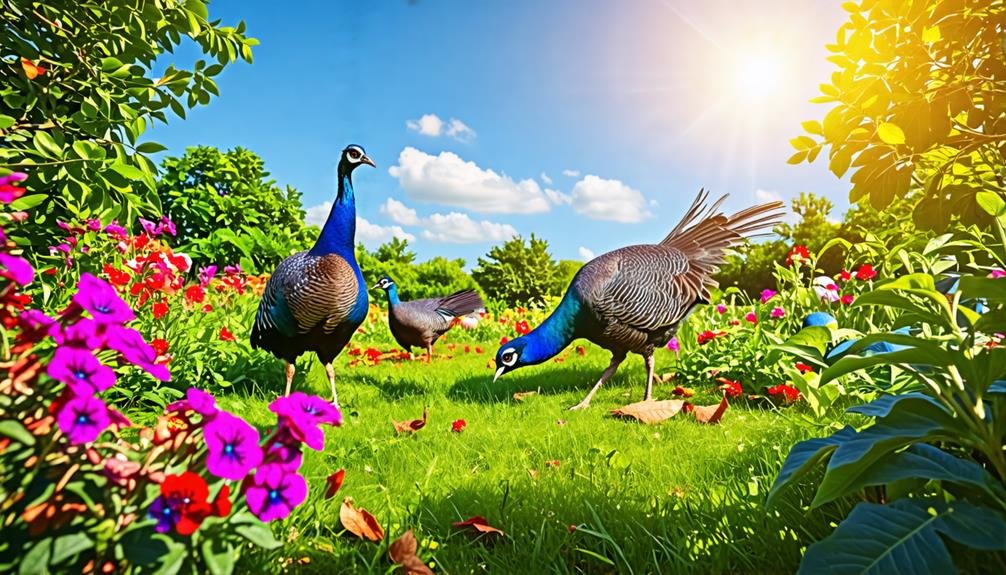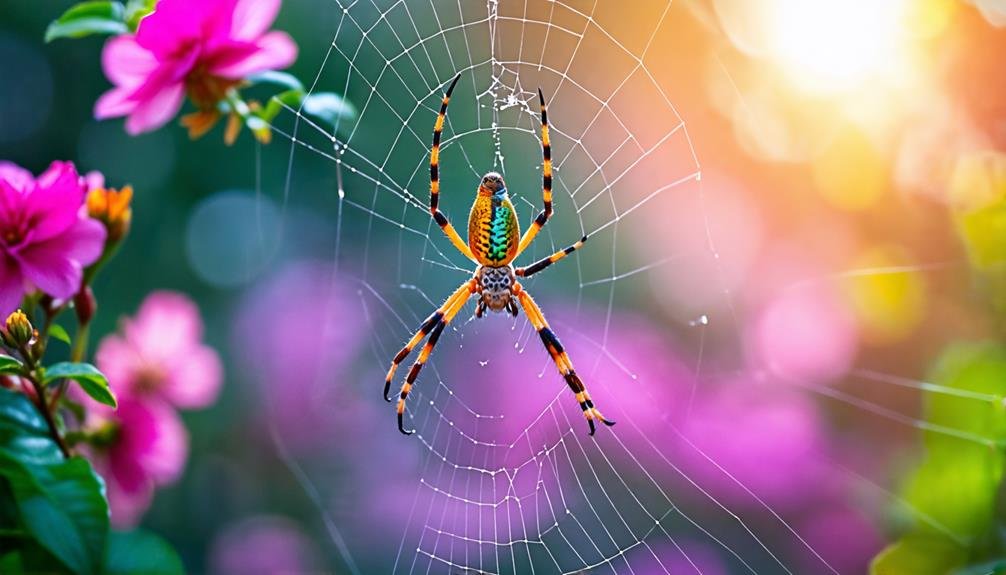To effectively keep cockroaches away from your yard, consider utilizing natural predators and fostering a pest-friendly environment. Attracting birds of prey, such as owls and hawks, can significantly reduce cockroach populations. Installing nesting boxes promotes their presence. Additionally, raising chickens and Guineafowl naturally controls insect numbers while enhancing your ecosystem. Ducks and geese also forage for pests while enriching the soil. Besides, planting native flowering species attracts beneficial insects like ladybugs, which actively consume cockroaches. Maintaining a compost pile can further encourage beneficial insects, promoting balance. For more insights on creating an effective pest control strategy, check out additional options.
Natural Predators in Your Yard
Incorporating natural predators into your garden can significantly lower cockroach numbers while improving the ecological balance of your outdoor space. Raptors, like Barn Owls and Red-tailed Hawks, are vital for pest management. They hunt cockroaches and various insects, making them essential allies for a pest-free environment. By installing nesting boxes or perches, you can attract these skilled hunters to your yard, benefiting from their nighttime and daytime hunting prowess.
Moreover, backyard chickens serve as effective natural pest controllers. These birds search for insects, including cockroaches, while providing fresh eggs for your family. A well-kept coop allows chickens to roam freely, enhancing your garden's health.
Guineafowl also act as excellent pest deterrents. Known for their social nature and loud calls, these birds consume cockroaches and other insects. Keeping guineafowl in a secure coop allows them to flourish, and their presence can serve as a natural alarm against potential threats.
Creating a Pest-Friendly Environment
Creating a pest-friendly environment involves designing your outdoor space to attract beneficial wildlife that naturally manages cockroach populations. By establishing habitats for various birds and other creatures, you can enhance your outdoor pest control methods and minimize the presence of garden pests like cockroaches without resorting to chemicals.
Begin by selecting native flora that offers nourishment and shelter for insects, birds, and diverse wildlife. This assortment not only fosters a thriving ecosystem but also promotes the survival of natural predators. For example, flowering species draw in pollinators, while dense shrubs provide nesting areas for birds that feed on cockroaches.
Additionally, consider incorporating elements such as birdhouses and water features to entice a variety of bird species, which can aid in regulating pest numbers. Poultry such as chickens and ducks can also contribute positively, as they forage for insects and help sustain a balanced ecosystem.
Attracting Birds of Prey

Attracting birds of prey, such as owls and hawks, can effectively enhance pest control in your yard. These natural predators actively hunt cockroaches and other insects, helping to maintain a balanced ecosystem.
To create an inviting environment for these raptors, consider installing nesting boxes or perches. Owls, as nocturnal hunters, control cockroach populations at night, while hawks, with their sharp eyesight, can detect pests from high vantage points. Incorporating open spaces and shrubs will increase the likelihood of their presence.
Maintaining a tidy yard is essential; remove debris and standing water that may attract cockroaches and other pests. Planting native flora, like goldenrod or milkweed, not only supports local wildlife but also creates a thriving habitat that appeals to birds of prey. By adopting these practices, you can transform your yard into a sanctuary for these beneficial predators, ensuring effective pest management against cockroaches and promoting ecological health. Embrace nature's role in fostering a pest-free environment.
Raising Chickens for Control
Raising chickens can be an effective strategy for controlling cockroach populations in your yard, as these birds naturally consume different insects, including cockroaches. To guarantee their health and productivity, it is crucial to provide a proper chicken coop that offers shelter, space to roam, and access to food and water. By incorporating chickens into your pest management plan, you not only reduce unwanted pests but also enjoy the additional advantage of fresh eggs.
Benefits of Raising Chickens
An effective strategy for controlling cockroach populations in your yard is incorporating backyard hens, which not only consume these pests but also provide the added benefit of farm-fresh eggs. Raising poultry can be an empowering choice for homeowners seeking to enhance their self-sufficiency while tackling pest issues.
Here are three significant advantages of raising hens:
- Natural Pest Control: Chickens actively forage for insects, including cockroaches, thereby reducing their numbers in your outdoor space. This instinctive behavior minimizes the need for chemical pesticides, promoting a healthier ecosystem.
- Fresh Eggs: In addition to pest control, hens produce fresh eggs, offering a sustainable food source. Home-raised eggs, like those from brands such as Vital Farms, are often tastier and healthier than store-bought alternatives, contributing to a more self-reliant lifestyle.
- Low Maintenance: Chickens are relatively easy to care for, requiring basic shelter, feed, and water. Their adaptability allows them to thrive in various environments, making them suitable for many homeowners.
Chicken Coop Essentials
Constructing a suitable chicken coop is crucial for ensuring the well-being and productivity of your flock while efficiently managing pest control in your garden. A perfect chicken house should provide ample space, effective airflow, and protection from wildlife, all of which are vital for maintaining healthy chickens. A well-ventilated structure helps to prevent moisture accumulation, thereby decreasing the likelihood of mold and harmful bacteria that could affect your birds and attract pests like German cockroaches.
Integrating a secure outdoor run enables hens to roam freely and forage for insects, including roaches. This instinctual activity not only enhances the nutritional value of their diet but also acts as a natural pest control method. Make sure the run is properly enclosed to shield your flock from potential wildlife threats.
Routine upkeep of the coop is essential; tidying the space and discarding any leftover feed helps avoid attracting unwanted pests. Additionally, installing nesting boxes filled with straw or pine shavings creates a cozy habitat for egg-laying.
Benefits of Guineafowl

Guineafowl offer notable benefits for pest control, especially in managing cockroach populations. Their social behavior, often observed as they roam in groups, boosts their effectiveness in foraging for insects and other pests across different areas. Moreover, these birds serve as natural alarms, alerting homeowners to potential threats, which further contributes to a healthier yard ecosystem.
Social Behavior Benefits
The social behavior of guineafowl significantly enhances their ability to control pests, particularly cockroaches. These birds thrive in groups, allowing them to cover larger areas effectively while foraging. Their natural flocking behavior not only improves their foraging efficiency but also offers several key benefits:
- Heightened Vigilance: Guineafowl are recognized for their distinctive calls, which function as warning signals. When one bird spots a potential threat or pest, the entire flock becomes alert, increasing the chances of spotting and dealing with cockroaches.
- Collective Foraging: By working together, guineafowl can traverse more ground. This teamwork leads to a comprehensive search for pests, effectively diminishing cockroach numbers in your garden.
- Pest Repellence: The mere presence of guineafowl can deter other pests from invading your area. Their social interactions and vocalizations create an unwelcoming atmosphere for cockroaches and other unwanted insects.
Natural Pest Control
Guineafowl are effective natural pest controllers, actively consuming cockroaches and various insects in residential gardens. These sociable birds prefer to gather in flocks, enhancing their foraging efficiency and pest deterrent abilities. As they search through plants and along the ground, guineafowl help manage insect populations and contribute to ecological stability in outdoor spaces.
In addition to their insect-eating habits, guineafowl produce loud vocalizations that function as alarms, warning homeowners of potential threats in their gardens. This behavior not only supports pest management but also bolsters property security. Their presence can discourage other pests, fostering a more balanced environment.
Furthermore, guineafowl require minimal maintenance compared to other poultry, such as chickens or ducks. By providing a secure shelter and allowing them to roam freely, homeowners can reap the rewards of pest control while enjoying the unique charm of these birds. Overall, incorporating guineafowl into your yard presents a sustainable solution for managing cockroach populations and promoting biodiversity.
Utilizing Ducks and Geese
Incorporating ducks and geese into your backyard can significantly enhance pest management by naturally lowering cockroach populations while offering additional advantages such as fostering ecological health. These birds are omnivorous foragers and consume various pests, including cockroaches, making them valuable partners in your battle against these unwelcome guests.
Here are three notable benefits of introducing ducks and geese to your yard:
- Natural Pest Management: Ducks and geese forage for insects, including cockroaches, decreasing their presence without relying on toxic pesticides.
- Environmental Advantages: These birds contribute to a healthy ecosystem by regulating insect numbers and enriching the soil with their droppings, which supports robust plant development.
- Visual Appeal: Ducks and geese enhance the charm of your outdoor area, bringing vibrant life to ponds and gardens while providing delightful entertainment for onlookers.
Encouraging Beneficial Insects

Encouraging a diverse population of beneficial insects in your garden can enhance natural pest control efforts against cockroaches and other unwanted pests. By creating a welcoming environment, you can attract predatory insects like ladybugs, lacewings, and spiders, which consume cockroaches and their eggs. Planting native flowering species such as coneflowers and herbs like basil can provide food sources for these helpful insects, while also promoting biodiversity in your garden.
To enrich this ecosystem, consider adding natural habitats, such as log piles or small rock gardens, that serve as shelter for predatory insects. Avoid using chemical pesticides, as brands like Ortho can harm beneficial species and disrupt the delicate balance of your yard's ecosystem. Instead, adopt organic gardening practices that support the health of both plants and insects.
Additionally, maintaining a compost pile can attract a variety of beneficial insects while enriching your soil. By doing so, you create an environment that not only deters cockroaches but also nurtures a vibrant, self-sustaining ecosystem. By supporting these beneficial insects, you empower your yard to flourish, providing a natural defense against cockroach infestations.



















You must be logged in to post a comment Login